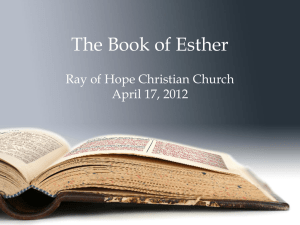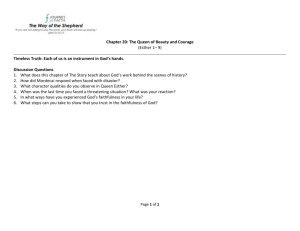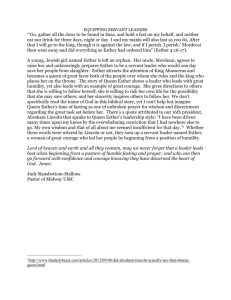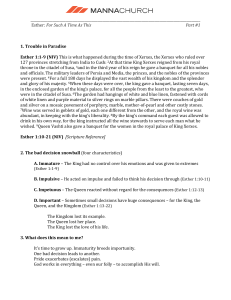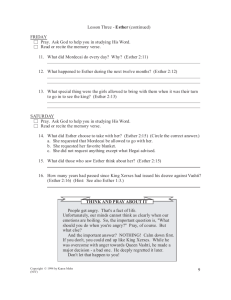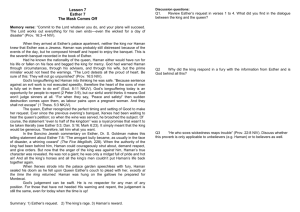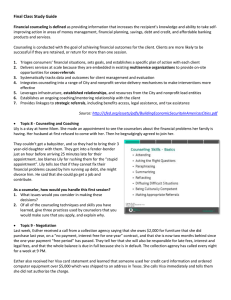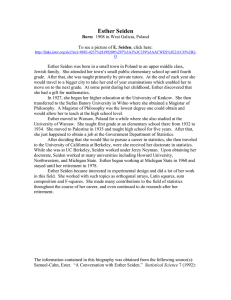Esther PPT
advertisement
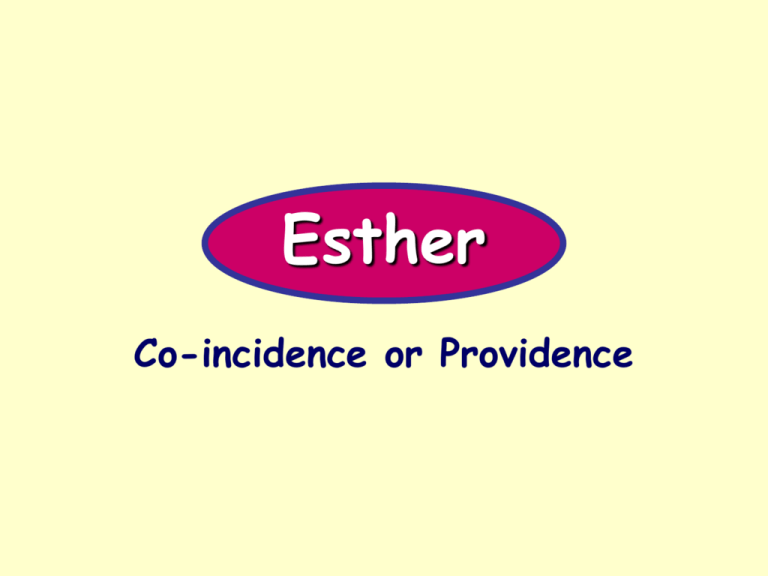
Esther Co-incidence or Providence The Name of God does not appear in the Book of Esther Or does it? Acrostics • The writers of the Old Testament sometimes used acrostics • They would arrange their material so as to commence the first word of each sentence with the successive letters of the Hebrew alphabet • Examples of this are found in Lamentations, Psalm 119 and Proverbs 31:10-31 The Name of God -YHWH - appears over 6 800 times in the Old Testament It is rendered LORD (all upper case) in the NIV and other translations It was regarded as too holy to pronounce - Israelites did not wish to risk “taking the name of the LORD in vain” (a misunderstanding of Lev 24:16) The rendering Jehovah arose when the vowel points of Adonai (Lord) were inserted between the consonants For example, consider the simple statement: “You have welcomed him.” It records a statement of fact but it so happens that the first letters of the four words, “You have welcomed him” spell YHWH There need not be any significance in this fact. Unless, of course, the acrostic is intentional. יְהוָ֥ה HWHY “Let the king, together with Haman, come today to a banquet I have prepared for him” (Esther 5:4) ָיבֹ֨וא המֶ ֶּ֤לְֶך והָ מָ ן֙ היֹּ֔ום today and Haman the king Let come There are said to be 4 instances of this acrostic, (1:20; 5:4, 13; 7:7) In the 1st and 2nd instances the Name is spelled by the first letters of the successive words and in the 3rd and 4th, by the last letters of the successive words. In some ancient Hebrew manuscripts, the letters of the acrostic are accentuated To be honest, this is not all that unlikely since the two letters H and W occur with great regularity (the definite article is formed by prefixing the letter H to a word and the W is the conjunction “and” which can be used to join words and also at the beginning of a sentence). Esther in its Historical Context Old Testament History - An Outline Assyria Babylonia N Kingdom A. Joshua (1240) Judges Egypt United Kingdom (721) (922) Remnant S Kingdom (586) The Prophets Ezekiel Hosea Daniel Jonah 537 BC Amos 722 BC Esther 483 930 BC Isaiah 587 BC Haggai Micah Nahum Habakkuk Zephaniah Joel ? Jeremiah Obadiah Zechariah Malachi Esther in Historical Context Return under Zerubbabel (537) Events recorded in Esther (483 ) Return under Ezra (458) “For such a time as this” Understanding why you are where you are God used: • The pride, militarism, insomnia and moodiness of the king • The courage of the deposed queen • The advice of the counsellors • An assassination plot • The conceit and hatred of Haman • The spirituality and perceptiveness of Mordecai • The hesitant intervention of Esther • King Xerxes’ insomnia Providence • Providence is the continuous agency of God by which he makes all the events of the physical and moral universe fulfil the original design with which he created it • It is “God’s attention concentrated everywhere” In relation to evil, God’s providence is: • Permissive. God permits free agents to commit sin • Preventive. God sometimes prevents sin that would otherwise have been committed • Determinative. God determines the bounds of evil • Directive. God directs evil acts to ends unforeseen and unintended by the agents. When evil is in the heart and will certainly come out - God orders its flow in one direction rather than another so that the least harm will result (A. H. Strong) “And we know that in all things God works for the good of those who love him, who have been called according to his purpose” Romans 8:28 See also Gen 45:4-8; 50:19-21; Acts 2:23; Phil 1:12-18
